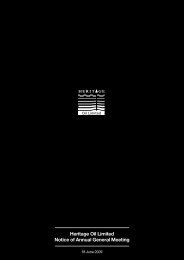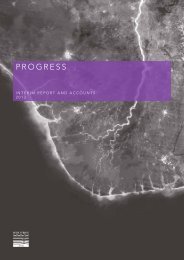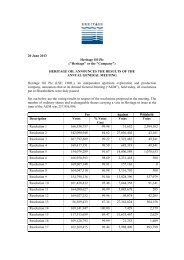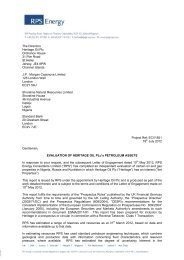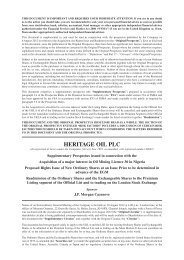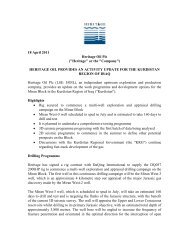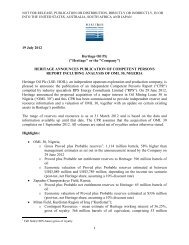Prospectus re Admission to the Official List - Heritage Oil
Prospectus re Admission to the Official List - Heritage Oil
Prospectus re Admission to the Official List - Heritage Oil
You also want an ePaper? Increase the reach of your titles
YUMPU automatically turns print PDFs into web optimized ePapers that Google loves.
<strong>to</strong> change. Whe<strong>re</strong> <strong>the</strong> Company pays a dividend <strong>to</strong> a holder of Ordinary Sha<strong>re</strong>s being anindividual <strong>re</strong>sident in <strong>the</strong> U.K. (for <strong>the</strong> purposes of U.K. tax law) that person may beentitled <strong>to</strong> a tax c<strong>re</strong>dit in <strong>re</strong>spect of <strong>the</strong> dividend <strong>re</strong>ceived. These provisions a<strong>re</strong> expected<strong>to</strong> apply <strong>to</strong> an individual who owns less than 10 per cent. of <strong>the</strong> Ordinary Sha<strong>re</strong>s in <strong>the</strong>Company provided that that individual <strong>re</strong>ceives less than £5,000 in dividends in any taxyear from companies which a<strong>re</strong> not <strong>re</strong>sident in <strong>the</strong> U.K. for tax purposes. The value of <strong>the</strong>tax c<strong>re</strong>dit is cur<strong>re</strong>ntly one ninth of <strong>the</strong> amount of <strong>the</strong> dividend <strong>re</strong>ceived (or 10 per cent. of<strong>the</strong> agg<strong>re</strong>gate of <strong>the</strong> amount of <strong>the</strong> dividend and tax c<strong>re</strong>dit). Such an individual will beliable <strong>to</strong> income tax on an amount equal <strong>to</strong> <strong>the</strong> agg<strong>re</strong>gate of <strong>the</strong> dividend and tax c<strong>re</strong>dit(<strong>the</strong> ‘‘gross dividend’’), which will be <strong>re</strong>garded as <strong>the</strong> <strong>to</strong>p slice of his income for taxpurposes and will be subject <strong>to</strong> U.K. income tax at <strong>the</strong> special dividend rate of tax asdescribed below.Individuals who a<strong>re</strong> not liable <strong>to</strong> income tax at a rate g<strong>re</strong>ater than basic rate (i.e. those whopay tax at <strong>the</strong> lower or basic rate only) will be liable <strong>to</strong> tax on <strong>the</strong> gross dividend at <strong>the</strong>‘‘dividend ordinary rate’’ of 10 per cent. This means that <strong>the</strong> tax c<strong>re</strong>dit will satisfy suchindividual’s liability <strong>to</strong> pay income tax in <strong>re</strong>spect of <strong>the</strong> gross dividend and <strong>the</strong><strong>re</strong> will be nofur<strong>the</strong>r tax <strong>to</strong> pay and no right <strong>to</strong> claim any <strong>re</strong>payment of <strong>the</strong> tax c<strong>re</strong>dit from <strong>the</strong> HMRC.In <strong>the</strong> case of individuals who a<strong>re</strong> liable <strong>to</strong> income tax at <strong>the</strong> higher rate, tax will bepayable on dividends at <strong>the</strong> ‘‘dividend upper rate’’ (cur<strong>re</strong>ntly 32.5 per cent.). The10 per cent. tax c<strong>re</strong>dit will be set against his liability <strong>to</strong> tax in <strong>re</strong>spect of <strong>the</strong> gross dividend.The<strong>re</strong>fo<strong>re</strong>, he will have <strong>to</strong> pay additional tax equal <strong>to</strong> 22.5 per cent. of <strong>the</strong> gross dividend(or 25 per cent. of <strong>the</strong> net dividend <strong>re</strong>ceived), <strong>to</strong> <strong>the</strong> extent that <strong>the</strong> gross dividend, whent<strong>re</strong>ated as <strong>the</strong> <strong>to</strong>p slice of his income, falls above <strong>the</strong> th<strong>re</strong>shold for higher rate income tax.Individual holders of Ordinary Sha<strong>re</strong>s who a<strong>re</strong> not liable <strong>to</strong> income tax in <strong>re</strong>spect of <strong>the</strong>gross dividend income cannot <strong>re</strong>claim payment of <strong>the</strong> tax c<strong>re</strong>dit from HM Revenueand Cus<strong>to</strong>ms.Subject <strong>to</strong> certain exceptions, a corporate Sha<strong>re</strong>holder which is <strong>re</strong>sident for tax purposesin <strong>the</strong> U.K. is not liable <strong>to</strong> tax on a dividend paid by <strong>the</strong> Company <strong>to</strong> it and is not able <strong>to</strong>claim <strong>re</strong>payment of <strong>the</strong> tax c<strong>re</strong>dit attaching <strong>to</strong> <strong>the</strong> dividend.(iv) Capital Gains TaxA disposal or deemed disposal of capital assets by a U.K. <strong>re</strong>sident or ordinarily <strong>re</strong>sidentsha<strong>re</strong>holder will give rise <strong>to</strong> ei<strong>the</strong>r a chargeable gain or an allowable loss. Gains and lossesa<strong>re</strong> calculated by deducting from <strong>the</strong> sale proceeds or, in some instances from <strong>the</strong> marketvalue of <strong>the</strong> time of disposal, <strong>the</strong> original cost and incidental costs of acquisition andincidental costs of disposal. Recipients within <strong>the</strong> charge <strong>to</strong> corporation tax may beentitled <strong>to</strong> an indexation allowance in computing a capital gain. Cur<strong>re</strong>ntly, a U.K. <strong>re</strong>sidentindividual or trustee may be entitled <strong>to</strong> taper <strong>re</strong>lief in computing a capital gain or loss. It isexpected that taper <strong>re</strong>lief will be abolished for disposals after 5 April 2008. U.K. <strong>re</strong>sidentindividuals or trustees may also be entitled <strong>to</strong> an annual allowance in arriving at <strong>the</strong>amount on which <strong>the</strong>y a<strong>re</strong> charged capital gains tax.A disposal or deemed disposal of a capital asset by a U.K. <strong>re</strong>sident or ordinarily <strong>re</strong>sidentindividual who is not domiciled in <strong>the</strong> U.K., will be liable <strong>to</strong> U.K. capital gains tax(‘‘CGT’’) in <strong>the</strong> same way as for a U.K. domiciled individual unless <strong>the</strong> asset is situatedoutside of <strong>the</strong> U.K. at <strong>the</strong> time of disposal. Whe<strong>re</strong> <strong>the</strong> asset is non-U.K. situated, gains willonly be taxed <strong>to</strong> <strong>the</strong> extent that <strong>the</strong> gains a<strong>re</strong> (or a<strong>re</strong> deemed <strong>to</strong> be) <strong>re</strong>mitted <strong>to</strong> <strong>the</strong>U.K. As <strong>the</strong> Company is incorporated outside of <strong>the</strong> U.K., and as its principal <strong>re</strong>gister ismaintained outside of <strong>the</strong> U.K. it is expected that <strong>the</strong> Ordinary Sha<strong>re</strong>s will be deemed <strong>to</strong>be non-U.K. situated for <strong>the</strong>se purposes. Various changes <strong>to</strong> <strong>re</strong>mittance basis a<strong>re</strong> expected<strong>to</strong> take place after 5 April 2008. An individual claiming <strong>the</strong> <strong>re</strong>mittance basis may losecertain tax allowance and, in certain cases, an individual may be charged a flat rate sum ofmoney befo<strong>re</strong> <strong>the</strong> <strong>re</strong>mittance basis can apply.If an individual ceases <strong>to</strong> be <strong>re</strong>sident or ordinarily <strong>re</strong>sident in <strong>the</strong> U.K. for a period of lessthan five years and disposes of <strong>the</strong> Ordinary Sha<strong>re</strong>s, in certain circumstances any gain onthat disposal may be liable <strong>to</strong> U.K. CGT upon that holder becoming once again <strong>re</strong>sident orordinarily <strong>re</strong>sident in <strong>the</strong> U.K.287





